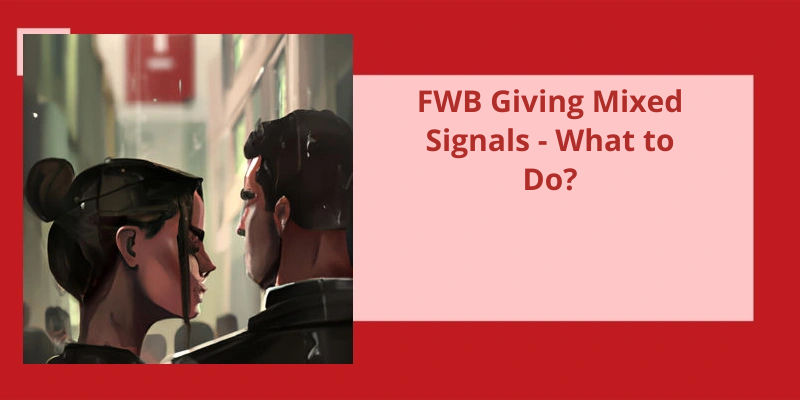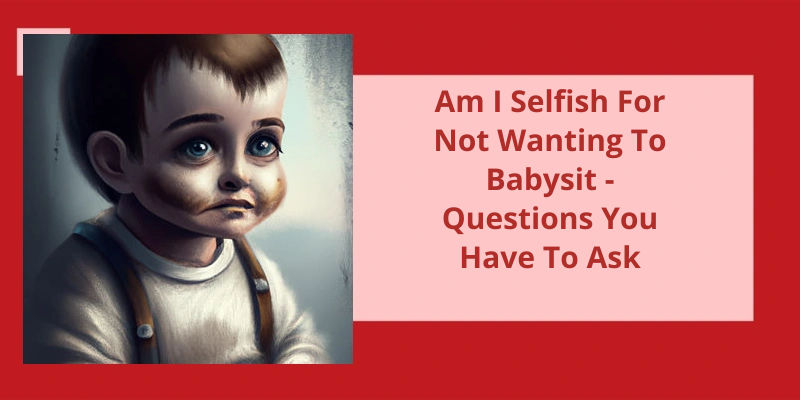Especially when one party is giving off mixed signals, it can leave the other feeling uncertain, confused, and even hurt. It's natural to wonder what the other person is thinking and feeling, and what their intentions could possibly be. While mixed signals can certainly indicate that the other person isn't fully invested in the relationship, it's important to remember that there could be more at play. In many cases, those who struggle with giving off mixed signals may actually have an avoidant attachment style, which can impact how they approach intimacy and closeness. As with any relationship, communication and honesty are essential, but when dealing with FWB situations, it's even more important to set clear boundaries and manage expectations.
What Are Red Flags in FWB?
Friends with benefits (FWB) relationships can be fun and exciting, but they can also lead to hurt feelings and misunderstandings if not handled properly. One of the biggest red flags in an FWB situation is when one person starts to develop stronger feelings for the other. If you begin to suspect that your FWB is becoming emotionally attached to you, this should be a warning sign that it’s time to reevaluate the situation.
Another red flag to watch out for is if your FWB starts to become possessive or jealous. Just because youre not in a committed relationship doesn’t mean that either of you’ve the right to control or manipulate the other. If you start to feel like your FWB is trying to exert control over your life or make unreasonable demands on your time and attention, this is a sign that it’s time to pull back and reassess the relationship.
Communication is key in any relationship, but especially in an FWB situation. If your FWB isn’t willing or able to communicate openly and honestly with you, this is another red flag. If you find yourself always guessing about their feelings or intentions, or if youre constantly experiencing misunderstandings or miscommunications, it’s time to have a serious conversation about what you both want out of the relationship.
Another warning sign in an FWB situation is if one person is consistently relying on the other for emotional support or comfort. While it’s natural to want to feel connected and supported in any relationship, if you find yourself constantly being the one who’s giving more than youre getting, this is a sign that the balance of the relationship is off. It’s important to have open and honest conversations about what you both need and expect from each other in terms of emotional support.
Finally, if you find that your FWB is consistently flaking out on plans or cancelling at the last minute, this is a sign that they may not be fully committed to the relationship. While it’s important to be flexible and understanding, if you find yourself always being the one who’s making accommodations and concessions, this is a sign that the relationship isn’t sustainable in the long term. It’s important to set clear boundaries and expectations from the beginning, and to be willing to walk away if those expectations aren’t being met.
Differences Between FWB and a Committed Relationship: Exploring the Boundaries and Expectations
This article discusses the key differences between a friends with benefits (FWB) arrangement and a committed relationship, including the boundaries and expectations involved in each.
While FWB (Friends with Benefits) relationships can be fulfilling for some, navigating the rules and boundaries can be tricky. These relationships are built on the foundation of sexual chemistry and friendship but without the commitment of a romantic relationship. However, like any relationship, it’s important to establish clear rules and boundaries to ensure that both parties are on the same page. In this article, we will explore some common FWB rules and how to make the most out of this type of relationship.
What Are FWB Rules?
FWB stands for Friends with Benefits and refers to an arrangement between two consenting adults who’ve agreed to have sexual relations without any expectation of starting a romantic relationship. While the rules of FWB relationships may vary, they’re often established before any sexual activity takes place. Ideally, these rules help to ensure that both parties are on the same page and that there are clear boundaries in place to prevent any misunderstandings.
One of the most important FWB rules is the need for open communication. This means being honest and upfront about your expectations and boundaries. If you don’t want to spend the night or get involved in anything more than sex, it’s important to make that clear from the outset. Similarly, if you start to develop feelings for your FWB or want to change the nature of the relationship in any way, it’s important to communicate this as soon as possible.
Another key FWB rule is the need for mutual respect. Both parties should be treated as equals and with the same level of respect that you’d give any other friend. This means being considerate of their feelings and not using them for your own desires or needs. It also means being respectful of their time and boundaries. If they don’t want to see you at a certain time or in a certain place, you need to respect that.
At the heart of successful FWB relationships is the willingness to keep things casual. This means avoiding anything that could be misconstrued as romantic or intimate. For example, holding hands, kissing, or cuddling are generally off-limits in an FWB relationship. The idea is to keep things light and fun, without any of the emotional baggage that often comes with more serious relationships.
Another important FWB rule is the need to take care of yourself. This means practicing safe sex and being responsible for your own health and wellbeing. It also means being honest with yourself about your own feelings and emotions. If you find that you’re developing feelings for your FWB, it may be time to end the relationship or have an honest conversation about where things are headed.
How to End an FWB Relationship Gracefully and Respectfully
- Be honest and direct with your FWB about your decision to end the relationship.
- Avoid ghosting or disappearing without any explanation.
- Express your appreciation for the positive aspects of the FWB relationship.
- Communicate your reasons for ending the relationship clearly and respectfully.
- Avoid blaming or criticizing your FWB for the end of the relationship.
- Listen to your FWB’s response and acknowledge their feelings.
- Set clear boundaries for future interactions and stick to them.
- Take time for yourself to process the end of the relationship and move forward.
- Be kind and compassionate towards yourself and your FWB.
Conclusion
It's important to approach these situations with empathy and understanding, as it may take time for someone with an avoidant attachment style to open up and trust. Communication is key in any relationship, so it's crucial to have an honest conversation about your needs and boundaries. Keep in mind that FWB arrangements have the potential to become messy if one person develops stronger feelings, so it's important to be clear about the nature of the relationship from the start. Ultimately, it's up to you to decide whether or not the mixed signals are worth navigating, or if it's best to move on and find someone who can give you the consistency and clarity you deserve.






